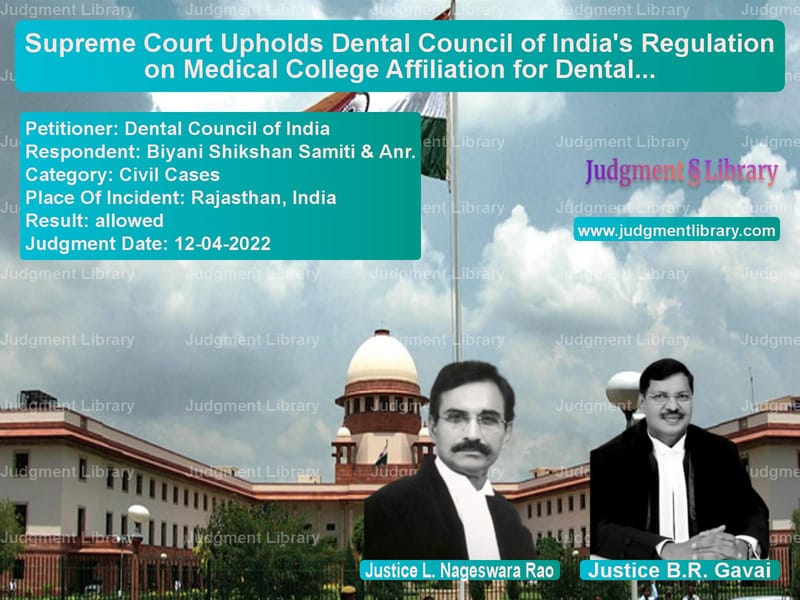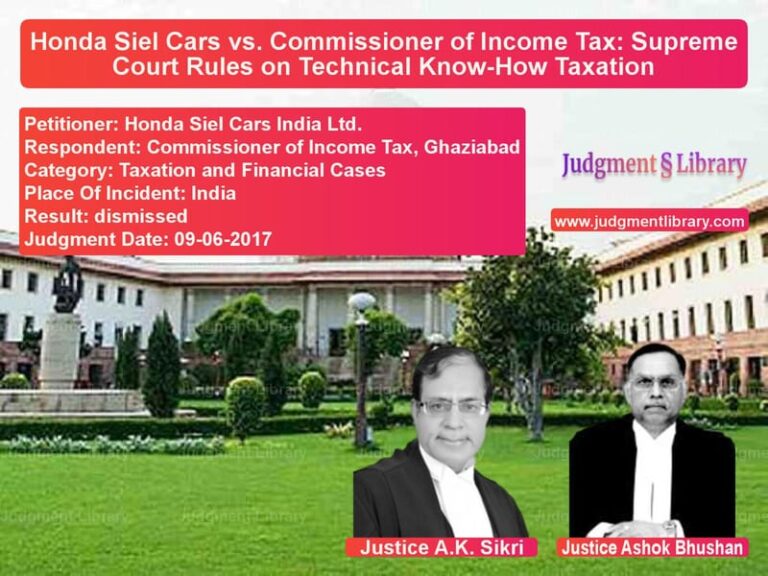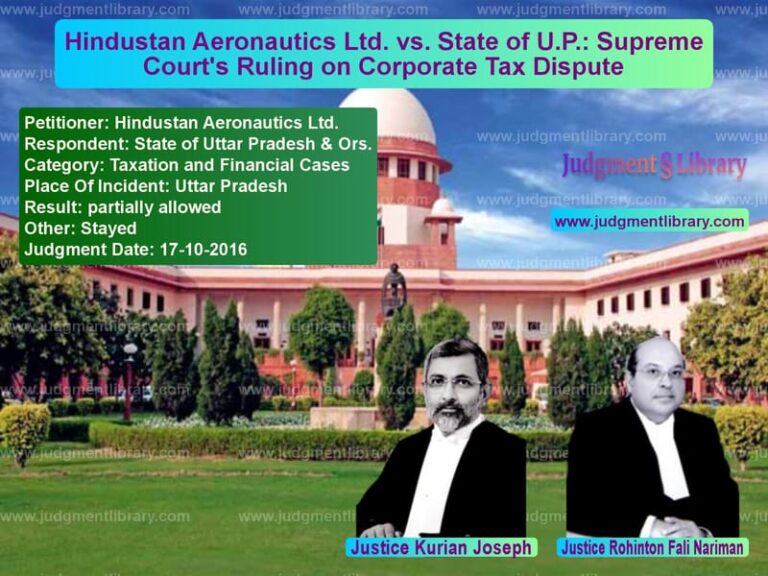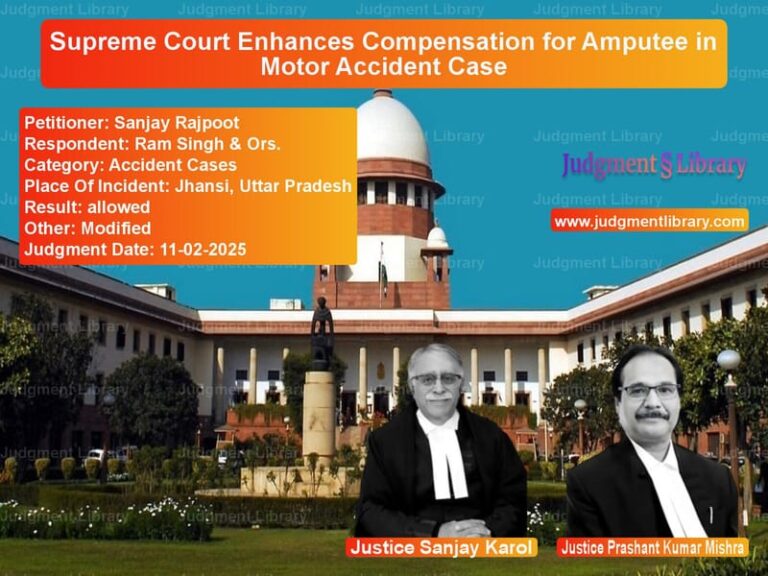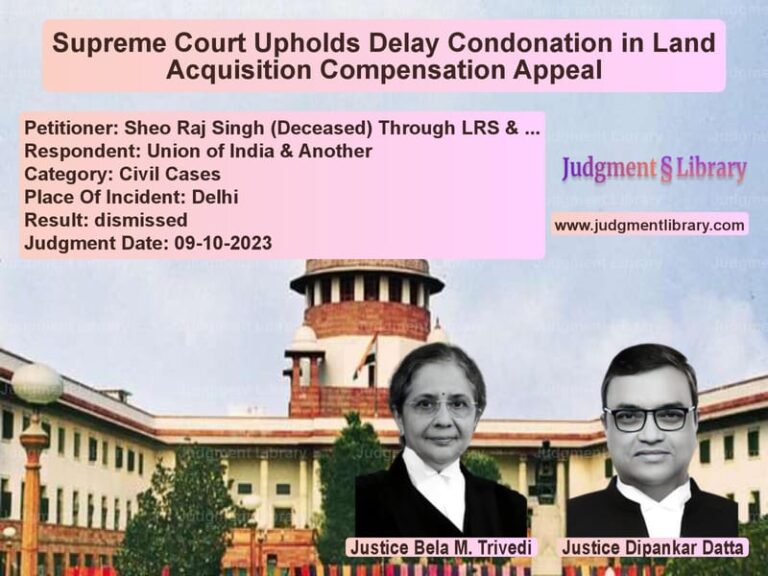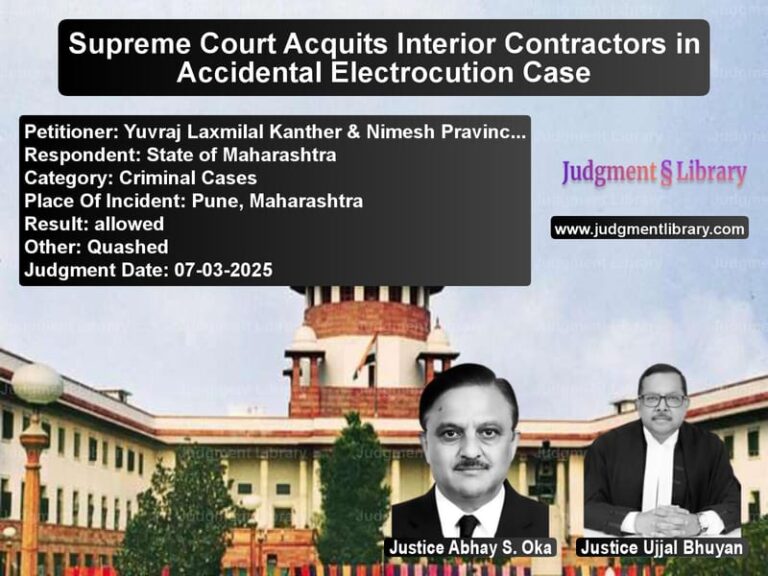Supreme Court Upholds Dental Council of India’s Regulation on Medical College Affiliation for Dental Colleges
The Supreme Court of India, in a landmark judgment in the case of Dental Council of India vs. Biyani Shikshan Samiti & Anr., upheld the validity of an amendment to the Dental Council of India regulations. The case revolved around the requirement that dental colleges must be affiliated with a recognized medical college within a specific distance. This ruling has significant implications for the regulation of dental education in India.
Background of the Case
The respondent, Biyani Shikshan Samiti, applied for permission to establish a dental college. However, the Dental Council of India (DCI) rejected their application due to regulatory amendments requiring dental colleges to be affiliated with a recognized medical college within a 10 km radius, later extended to 30 km.
The respondent challenged this regulation before the Rajasthan High Court, arguing that it violated their fundamental rights under Articles 14 and 19(1)(g) of the Indian Constitution. The High Court ruled in favor of the respondent, striking down the regulation as arbitrary and unconstitutional.
Read also: https://judgmentlibrary.com/supreme-court-rules-in-favor-of-colorblind-candidates-for-ftii-courses/
Legal Issues Before the Supreme Court
- Whether the Dental Council of India has the authority to impose such a regulation.
- Whether the requirement for dental colleges to be affiliated with a recognized medical college violates fundamental rights.
- Whether the regulation serves a legitimate public interest by improving the quality of dental education.
Arguments of the Petitioner (Dental Council of India)
- The DCI argued that the amendment was necessary to ensure that dental students received adequate clinical exposure in a medical environment.
- It stated that the quality of dental education would be compromised if students did not have access to the facilities of a recognized medical college.
- It contended that the requirement was a policy decision made by an expert statutory body and should not be subject to judicial interference.
Arguments of the Respondent (Biyani Shikshan Samiti)
- The respondent argued that the regulation arbitrarily restricted their right to establish a dental college.
- They contended that the requirement was not mandated by the Dentists Act and was therefore beyond the powers of the DCI.
- They further argued that several dental colleges were already operating successfully without being attached to a medical college.
Supreme Court’s Analysis
The Supreme Court emphasized that regulatory bodies like the DCI have the authority to frame regulations in the interest of educational standards. The Court observed:
“The Council is an expert statutory body empowered to make regulations concerning the establishment and operation of dental colleges. The impugned notification was introduced to enhance the quality of dental education and ensure adequate clinical training for students.”
The Court further noted that while educational institutions have a right to operate under Article 19(1)(g), such rights are subject to reasonable restrictions in the interest of maintaining academic standards. The judges held that requiring dental colleges to be attached to a medical college was a reasonable requirement aimed at ensuring students received comprehensive clinical exposure.
Key Points from the Judgment
1. Expert Regulatory Bodies Have Authority
The Court reaffirmed that professional regulatory bodies like the DCI have the authority to set standards for education:
“The requirement of affiliation with a recognized medical college is a rational policy decision aimed at improving educational infrastructure. Courts should not interfere with policy decisions unless they are manifestly arbitrary.”
Read also: https://judgmentlibrary.com/supreme-court-orders-compensation-for-victims-of-meerut-fire-tragedy/
2. Right to Establish Educational Institutions is Not Absolute
The Court emphasized that while the Constitution grants the right to establish educational institutions, this right is subject to reasonable regulations:
“The regulation does not take away the right to establish a dental college. It only ensures that such colleges maintain a certain standard of education.”
3. Regulation Serves a Legitimate Purpose
The Supreme Court ruled that the requirement serves a legitimate public interest:
“The regulation ensures that students receive the necessary clinical exposure, which is crucial for their professional development.”
4. No Violation of Fundamental Rights
The Court rejected the claim that the regulation violated fundamental rights:
“A requirement aimed at improving educational standards cannot be termed as unconstitutional merely because it imposes certain conditions.”
5. Overruling the High Court’s Decision
The Supreme Court overturned the Rajasthan High Court’s ruling, holding:
“The High Court erred in striking down the regulation, as it failed to consider the regulatory authority of the DCI.”
Final Judgment
- The Supreme Court allowed the appeal.
- The Rajasthan High Court’s decision was set aside.
- The regulation requiring dental colleges to be affiliated with a recognized medical college was upheld.
- The Court directed all pending applications for new dental colleges to comply with the regulation.
Impact of the Judgment
- Strengthens regulatory oversight of dental education in India.
- Ensures that dental students receive proper clinical training.
- Reaffirms the principle that policy decisions should not be interfered with unless they are arbitrary.
- Provides clarity on the authority of the Dental Council of India in setting educational standards.
Conclusion
The Supreme Court’s ruling in Dental Council of India vs. Biyani Shikshan Samiti & Anr. reinforces the principle that professional regulatory bodies have the authority to set educational standards. By upholding the regulation requiring dental colleges to be affiliated with a medical college, the Court has ensured that students receive the necessary clinical exposure for their professional development. This decision will serve as a precedent in future cases concerning educational regulations and professional oversight.
Read also: https://judgmentlibrary.com/supreme-court-upholds-eviction-decree-in-rajasthan-rent-control-case/
Petitioner Name: Dental Council of India.Respondent Name: Biyani Shikshan Samiti & Anr..Judgment By: Justice L. Nageswara Rao, Justice B.R. Gavai.Place Of Incident: Rajasthan, India.Judgment Date: 12-04-2022.
Don’t miss out on the full details! Download the complete judgment in PDF format below and gain valuable insights instantly!
Download Judgment: dental-council-of-in-vs-biyani-shikshan-sami-supreme-court-of-india-judgment-dated-12-04-2022.pdf
Directly Download Judgment: Directly download this Judgment
See all petitions in Education Related Cases
See all petitions in Judgment by L. Nageswara Rao
See all petitions in Judgment by B R Gavai
See all petitions in allowed
See all petitions in supreme court of India judgments April 2022
See all petitions in 2022 judgments
See all posts in Civil Cases Category
See all allowed petitions in Civil Cases Category
See all Dismissed petitions in Civil Cases Category
See all partially allowed petitions in Civil Cases Category

